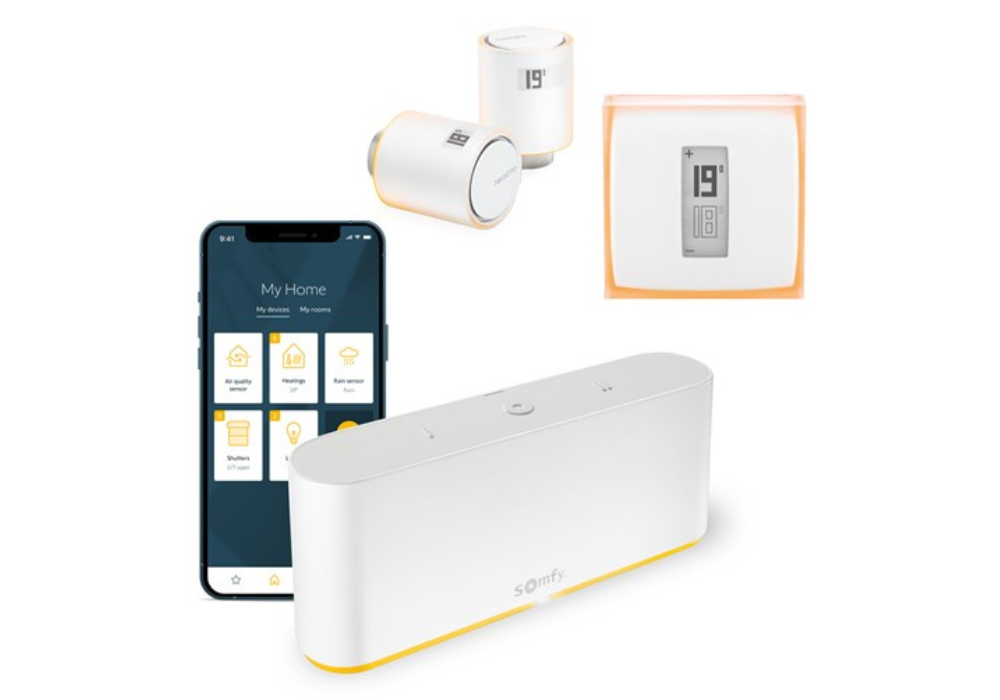
Netatmo utökar samarbete med Somfy

Before we take a look at how to improve the energy efficiency of buildings, it’s important to ascertain exactly what we mean by the term energy efficiency.
You might have come across the term energy efficiency in the building sector, when you’re looking into purchasing or renting a new home or other type of property, in themes of ecology, energy transition, insulation, and so on.
What’s more, energy efficiency is becoming a topic that’s discussed more and more - and for good reason, too. As we know, it’s vital that we use energy consciously in order to protect the environment.
The energy consumption of every building contributes to greenhouse gas emissions that propel climate change, so it’s vital that we maximise each and every building’s energy efficiency as far as possible.
It’s worth mentioning that, while increasing energy efficiency is, of course, beneficial for the planet, it’s also a plus for your home energy bills, too. The higher the energy efficiency of your home, the less energy you’ll need to use in order to maintain the levels of heating, and other energy functions, that you’re used to.
The term energy efficiency refers to how much energy a given building consumes over an annual period.
The energy efficiency of a building depends on the quality of the property itself, the insulation installed in the building, the quality or efficiency of its energy equipment and how this energy equipment operates.
The energy efficiency of a building can be calculated based on criteria including consumption of energy in the home for heating, hot water, lighting, ventilation, air conditioning, and so on.
Data on the energy setup in the home is also taken into consideration. This includes the energy equipment within the building, such as boilers, how much sun the building is exposed to, how comprehensive the insulation is throughout the building, the design of the home or other type of property, and so on.
These types of data are compiled to assess the energy efficiency of a building. Once these data have been collated, an assessment of the energy efficiency of the building can be generated.
This value will show you where the building stands in terms of both energy consumption and levels of greenhouse gas emissions and is stated in an Energy Performance Certificate (EPC) for the home.
In the UK, an Energy Performance Certificate (EPC) is required for any property that is built, sold or let.
If you need an Energy Performance Certificate (EPC) for your home or other type of property, you can search for registered domestic energy efficiency assessors for your local area. This assessment is a two part process:
An Energy Performance Certificate (EPC) aims to give an accurate rating and assessment of the energy efficiency of a building. That way, you can get a clear picture of the energy efficiency levels of a building that you might be looking to buy, rent or even sell.
As we know, Energy Performance Certificates (EPCs) are required for all homes constructed, sold or let in the UK. The ratings these contain are based on multiple data variables, such as the amount of sun which the home is exposed to, its levels of insulation, the layout of the buildings and the material the property is made from.
Energy Performance Certificates (EPCs) also include data on the energy setup in the home, covering heating, hot water, cooling and ventilation.
There are multiple ways we can increase building energy efficiency:
A Netatmo Smart Thermostat is a connected thermostat that allows you to reduce your home energy consumption, while maintaining great levels of thermal comfort in your home! Remotely adjust and program your home heating from your smartphone or tablet, wherever you are and whenever you want. It’s a smart way to optimise your energy use at home!
Optimising energy efficiency in your home does mean an up-front investment, as you’ll need to consider options such as increasing the amount of effective thermal insulation installed in the home and installing more energy efficient devices for using energy to supply heat and hot water for the home.
Once you’ve increased your home energy efficiency, though, you’ll be well set to make significant savings on your home energy bills. With greater energy efficiency, you’ll need to consume less energy in the home to produce the levels of heat, hot water, lighting, and so on that you’re used to having in the building.
Reducing energy consumption and greenhouse gas emissions in all building types is a priority we all need to shoulder. Improve energy efficiency in your home to protect the environment and reduce your home energy bills!